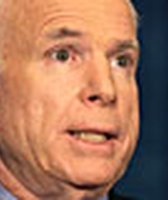Stand up for the facts!
Our only agenda is to publish the truth so you can be an informed participant in democracy.
We need your help.
I would like to contribute
Call the exaggeration police
Sen. Joe Biden, D-Del., was indeed a leading advocate for Community Oriented Police Services, or COPS, a key part of the 1994 crime bill. But once we get past that, what the program actually accomplished isn't nearly as clear-cut as Biden maintains.
Let's consider his claim in two parts.
Part 1: The COPS program was designed to use three-year federal grants to put an additional 100,000 officers on the street from 1994 through 2000. The Justice Department claims it reached that milestone in May 1999, but the department's Office of Inspector General found that the actual number was closer to 60,000.
"Moreover, because some of the early grants are going to be expiring, and therefore the obligation to retain the officers will expire, there is some concern that we will never have 100,000 officers on the street at the same time," Robert L. Ashbaugh, the acting inspector general, told the House Subcommittee on Crime in October 1999.
The discrepancy in numbers was due to certain assumptions the Justice Department made about how local agencies spent their COPS grants, the report and another study found. This was especially true for certain grants designed to redeploy officers from desk jobs to the street by paying for new technology, the inspector general found.
"Just because you get the money, that doesn't mean you're using it" for officers, said David Muhlhausen, a senior policy analyst at the conservative Heritage Foundation who has studied the COPS program.
The Justice Department stands by its figure of putting 100,000 officers on the street, a spokesman said. It appealed the inspector general's report to a special master, who found the report did suffer from misinterpreting some Justice Department data.
The discrepancy has never really been solved. A 2005 report on COPS by the Government Accountability Office did not directly address it, but said that, "For all years from 1994 through 2001, we estimate that COPS expenditures paid for a total of about 88,000 additional officer-years."
Part 2: Biden's claim that crime rates dropped "as a result" of those extra officers is, in the words of several criminologists, "absurd," "simplistic" and "ridiculous." This is what sealed our ruling of False.
While it may seem intuitive that putting more cops on the beat would deter crime, several government and independent studies have failed to prove a strong link between COPS and the 32 percent drop in violent crime rates from 1993 to 2001.
An October 2005 report by the U.S. Government Accountability Office, the investigative arm of Congress, found that COPS helped cut crime modestly, about 1.1 percent in 1997 and as much as 1.3 percent in 2000, at a cost of some $8-billion.
"While we find that COPS expenditures led to increases in sworn police officers above levels that would have been expected without these expenditures, and though the increases in sworn officers led to declines in crime, we conclude that COPS grants were not the major cause of the decline in crime from 1994 through 2001," the GAO report said. "Other factors ... combined to contribute more to the reduction in crime than did COPS expenditures.
"This is not surprising, as COPS expenditures ... made a comparatively small contribution to local law enforcement expenditures for policing."
More recently, a peer-reviewed study published in the February 2007 issue of the journal Criminology found that "COPS spending had little to no effect on crime."
The exception was a 2002 study by researchers at the University of Nebraska and Southwest Texas State University, which found COPS had a major effect on cutting crime from 1994 through 2000, particularly in big cities. But the study was funded by the COPS program, raising questions of impartiality, and it failed to account for changing demographics after 1994. It also ignored the fact that crime was already dropping nationwide before COPS existed, critics said.
In reality, studies show that no one thing — not even Biden's army of officers — can take credit for the declining crime rate in the 1990s and first five years of this century. Rather, it was likely the result of a complex series of factors, including population shifts, an improving economy, longer prison sentences for violent criminals, better policing and changes in drug use.
Our Sources
U.S. Government Accountability Office, 2005 report on COPS
Browse the Truth-O-Meter
More by Wes Allison
Call the exaggeration police
Support independent fact-checking.
Become a member!
In a world of wild talk and fake news, help us stand up for the facts.











































